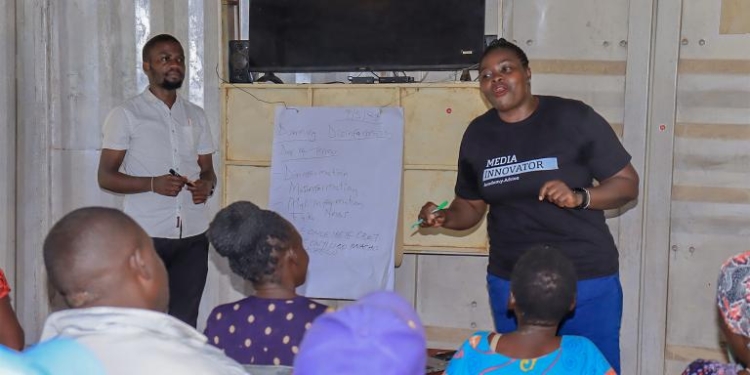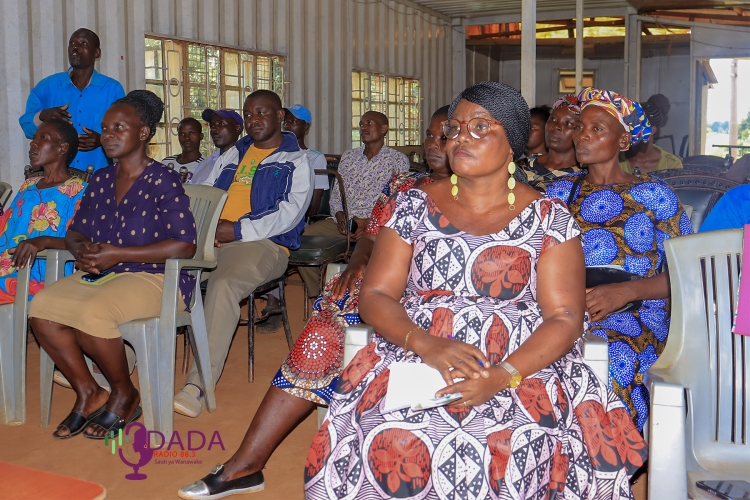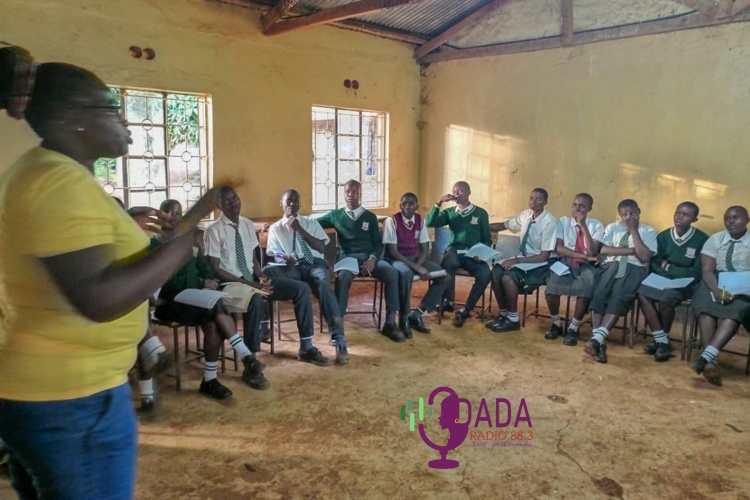The International Center for Journalists’ (ICFJ) Disarming Disinformation initiative is a three-year program, supported by the Scripps Howard Foundation, that aims to slow the spread of disinformation through multiple programs such as investigative journalism, capacity building and media literacy education. ICFJ partnered with MediaWise from the Poynter Institute to develop and deliver media literacy programming.
The media literacy training of trainers program accepted global participants for two different cohorts. The participants are community leaders who will educate others on the importance of media literacy and how to apply those skills in real life. The article below is one of five impact stories selected from the first cohort in celebration of media literacy week.
Harriet Atyang is helping build a stronghold against disinformation in western Kenya. As the founder of a local radio station called Dada Radio based in Siaya, Kenya, she believes in the power of information.
“Information can make or destroy a community. Being a community leader and journalist, I love educating my community, especially rural women, most of whom are disadvantaged as technology continues to grow,” she said.
In January 2024, Atyang took part in the first 19-person cohort of Disarming Disinformation’s training of trainers in which she learned from MediaWise how to use and teach media literacy skills. In the months since, she has passed on those skills through mentorship programs for journalism students and workshops for community members, training 67 people to date. At Dada Radio, she ensures all station presenters are equipped with media literacy skills and routinely carries out media literacy training through on-air programs.
In her trainings, Atyang has brought together a person spreading misinformation and the subject of that misinformation to have a productive conversation; taught high school students to produce professional-level fact-checks that were published on the radio; inspired those students to pursue a journalism career; and launched a mentorship program for high schools.

What drives Atyang
Growing up in the town of Busia, located in western Kenya close to the Ugandan border, Atyang walked to and from school barefoot, in the sweltering sun, often without food and only a little water. Sometimes the only drink to consume was the local alcohol her mother would illegally distill to earn a few shillings, although not enough to feed her entire family. If they found a tossed-out piece of moldy bread, it was as if they “had a feast to eat,” she recalled.
The third born of eight children, Atyang spoke of how her mother left her father to get away from the abusive relationship and later came back to rescue her during the night.
Through it all, she never wavered in her desire to go to school, to receive an education, to study journalism and to help people who are unable to help themselves. This drive makes her the trusted journalist and community leader she is today — one who is passionate about supporting women, strives for excellence in journalism, and cares deeply for her community.
Atyang launched Dada Radio in 2023. Dada, which is Swahili for sister, has broken standard norms, broadcasting in the local language of Luo and prioritizing stories that impact women and girls — putting their needs first.
Advice on training and media literacy
For a small community radio station, where learning journalism by trade is normal over traditional education, Atyang pursued the Disarming Disinformation training of trainers program knowing that media literacy techniques could have immediate and lasting impacts for her team at Dada Radio, for her community and for local journalism students.
“This training opportunity came at a time when I really needed to help my community to promote responsible sharing of information,” she said.
When asked her biggest piece of advice for others looking to conduct media literacy workshops, she said to “work the program around the participants’ availability, not the trainer’s availability.”
This approach can not be emphasized enough. To ensure their audience is mentally present to engage in the learning materials, a trainer must work around the audience. This creates a welcoming learning environment.

Atyang admitted she was not sure what the rural community would think about media literacy considering the town does not necessarily have access to advancing technology, like other parts of Kenya and the world.
“I was surprised by the level of interest and enthusiasm from the participants,” she said. “I was expecting some skepticism, especially due to the fact that my participants are rural residents, and may not have been interested in media literacy.”
The concern quickly dissipated once Atyang was in the room with her participants. “(They) were very eager to learn and put into practice the knowledge they acquired during the training,” she noted.
Someone who had spread false information about a local person entered one of the workshops, only to find that the person they had wronged was also there. After a few games demonstrating the characteristics of misinformation, how it can evolve and how to trace it back to its source, the person who had shared misinformation apologized for the harm they had caused. This unique instance, with both the spreader of misinformation and the victim in the same workshop, changed lives and healed wounds.
When it comes to media literacy, digital hygiene is the one skill that everyone should know, urged Atyang. Digital hygiene refers to the precautions someone can take to ensure their data and devices are secure both online and offline.
Verification tools are also crucial, she said. Journalists and people in their daily lives alike can use these tools to fact-check what they see on social media.

Equipping a new generation
Atyang’s passion that carried her on her life’s journey continues to this day supporting the next generation of journalists.
One immediate impact originating from these workshops is a mentorship program for journalism club members at one of the secondary schools in the community. Atyang and her team at Dada Radio continue to focus on media literacy within the schools, while also incorporating news production skills.
The mentorship program amplifies the importance of media literacy while also nurturing students’ passion for journalism and desire to pursue a career in the industry. As part of the program, the students will provide one verified news story per week to be aired on Dada Radio.
In early 2025, five more community schools will offer the mentorship, reaching at least 200 students with media literacy and news production skills. Atyang aims to launch small newsrooms in these schools so the students can get hands-on experience. Meanwhile, at Dada Radio, she plans to launch a fact-checking desk with at least one person dedicated solely to using fact-checking tools to verify news stories.
“We will continue the conversation of media literacy,” Atyang promised. “We will continue the conversation about media literacy on air and off air, during other community engagement activities and (relying on) those who have been trained to keep sharing their skills with other community members.”
This article was first published on IJNet.
Renata Salvini and Muskan Bansal contributed to this article.
Photos courtesy of Dada Radio.